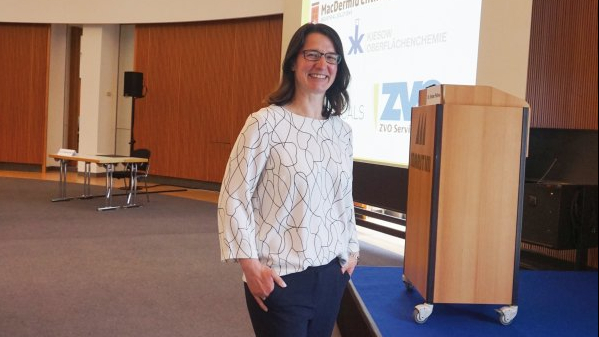Katja Feige, Group Leader Electroplating Technology at Fraunhofer IPA and event manager at the 44th Ulm Talk. Interview: Robert Piterek
What significance will artificial intelligence and digitalization have in the electroplating and surface technology of tomorrow?
AI and digitalization will also influence electroplating and surface technology in the future. The first approaches are already in place and the first implementations have already taken place. However, the time frame is still uncertain. B+T, for example, is playing a pioneering role. It will take a while for others to adopt these technologies. At the very least, digitalization will grow. The extent to which artificial intelligence will support all of this is an issue for the future. Our reservations could limit the influence of artificial intelligence. In any case, digitalization has great potential to make processes more stable and also more efficient.
At the current Ulm Dialogue, this topic was included as part of the focus on "Measurement - Control - Regulation". What has impressed you most about the event so far in terms of technology and why?
Before I sum up, we'll wait for the presentations on quality assurance. The presentation by Bosch on high-speed coating has been impressive so far, although it only works with variance 1 but an extremely high number of units. I also found the presentation by Dr. Bocklisch from Chemnitz University of Technology on man and machine as team players interesting. It was a different approach to the topic. Technologically, we can see that there is a lot of potential for the industry. This was also demonstrated today by Metrohm's presentation on the in- and online analysis of electrolyte components. You can work well in individual areas and ultimately create a high degree of flexibility in the process. For me, it has been a good mixture of everything we have in this area so far.
You represent Prof. Wolfgang Paatsch in Ulm. He wrote in the electroplating technology editorial that electroplating technology ideally fulfills the framework conditions for sustainable industrial goods production. How do you see that?
Sustainability characterizes all electroplating processes. But electroplating is also a means of working more sustainably in the future. With the help of process analytics, for example, it is possible to work more resource-efficiently.
This year's Nasser Kanani Prize went to a scientist who is researching photoelectric water splitting. Is this a sustainable innovation for the climate-neutral transformation of society and industry?
Yes, it is. But electroplating is also important for other technologies in the energy transition, such as fuel cell and hydrogen technology. That's why innovations like these are so important. In this way, electroplating technology creates sustainability and durability in equal measure. In electrolysers, for example, iridium layers are required for hydrogen production.
"Companies should focus on future-proof technologies!"
How do you see the future of electroplating and surface technology in general?
Classic electroplating technology - including chrome plating - is here to stay. We will always need it. However, companies should also focus on future-proof technologies and develop new coatings and new applications, for example, and expand their product portfolio.
INFO
Katja Feige stood in for event director Prof. Wolfgang Paatsch at the 44th Ulm Dialogue at the end of May because he was unable to attend due to illness.
The materials scientist, who trained at Ilmenau Technical University, has been working at the Fraunhofer Institute for Manufacturing Engineering and Automation IPA in Stuttgart for more than 18 years. She is a group leader in the Electroplating Technology department there.


